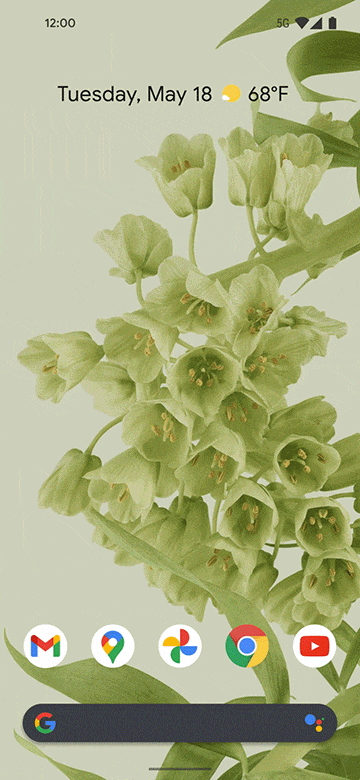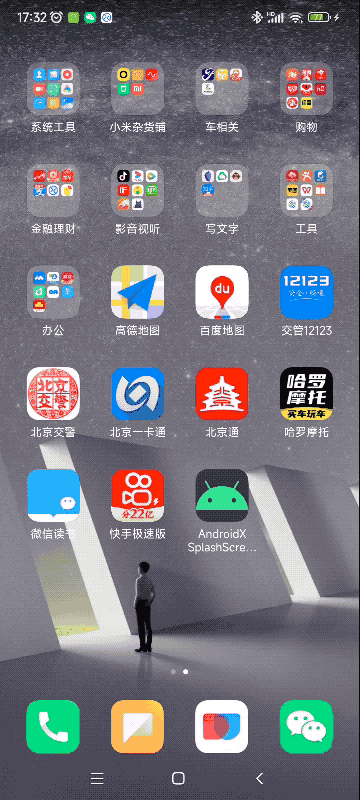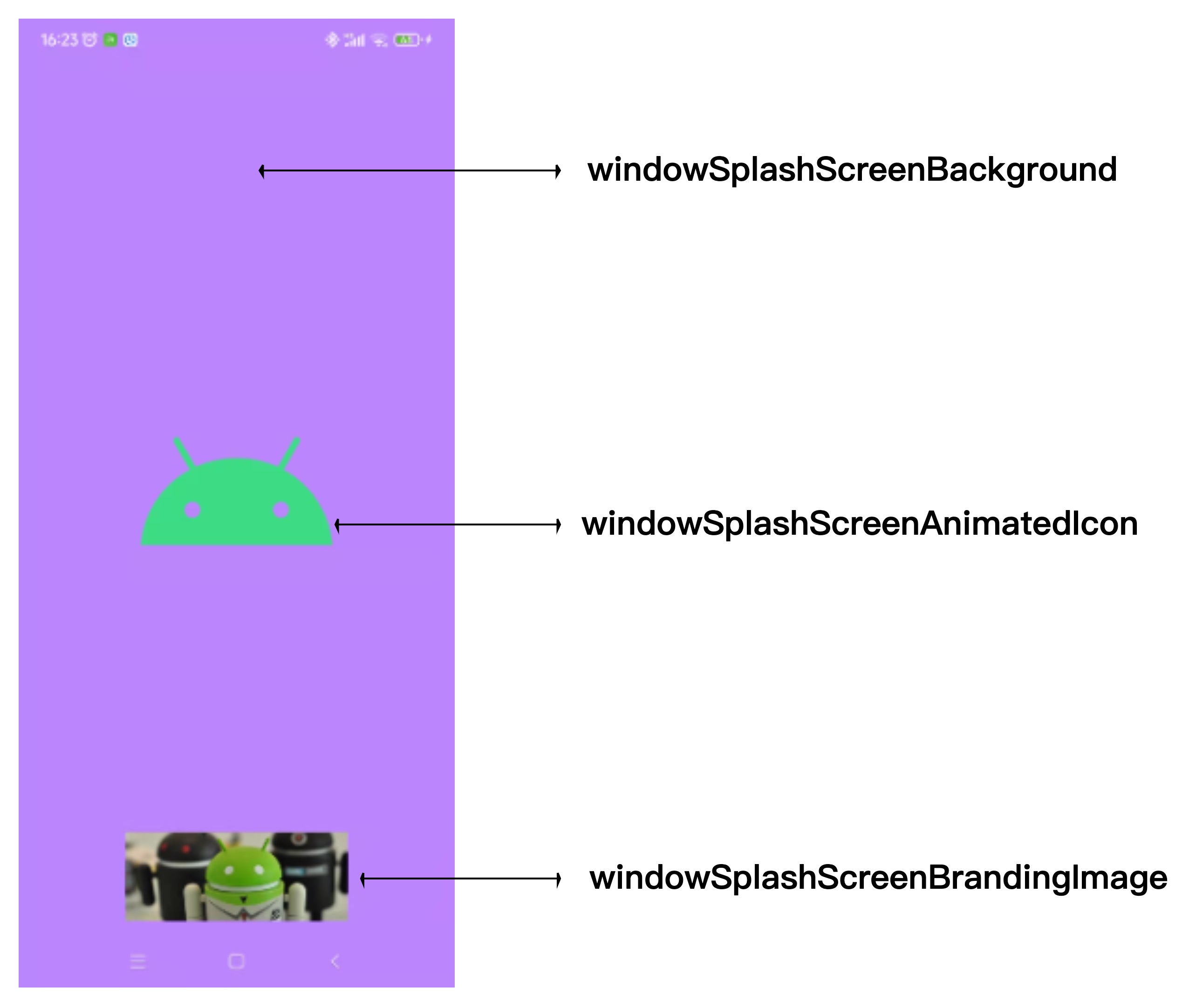Android 12 适配指南——SplashScreen
Android 12(API 31)引入了 SplashScreen 相关API,用于开发Android应用的启动页。
-
影响在Andorid 12设备上运行的所有应用:
SplashScreen相关API的引入影响在Andorid 12设备上运行的所有应用。这一点对于应用开发者来说,无论你的应用targetSdkVersion版本是多少,均需要进行SplashScreen的适配工作。 -
必须进行SplashScreen的适配工作:
若开发者未进行SplashScreen的适配工作,当应用运行于Android 12及以上版本的设备,在应用的冷启动 或 温启动时,Android系统都会构造一个默认启动动画(默认启动动画由应用ICON+应用主题的windowBackground内容构成)。
因此,对于未进行SplashScreenAPI适配工作的应用,在冷启动和温启动时,可能会呈现两个启动页先后出现的情况(Android SplashScreen启动页 + Android应用自定义开发的启动页或引导页)。
先看一下Andorid官方给出的SplashScreen启动页运行效果。

- SplashScreen 使用方式
- SplashScreen 启动页构成
- SplashScreen 使用举例源码下载
一、使用方式
按照官方相关迁移文档,我开发了以下启动页的运行效果。

下面以我开发的这个案例效果为例,举例说明SplashScreen相关API的使用方式:
- build.gradle 添加相关依赖;
- 自定义SplashScreen主题;
- 自定义启动页Activity;
1.1 build.gradle
build.gradle 中:
- 更改 compileSdkVersion 的版本;
- 引入 splashscreen 相关依赖 ;
android {
// 更改 compileSdkVersion 的版本
compileSdk 31
}
dependencies {
// 引入 splashscreen 相关依赖
implementation "androidx.core:core-splashscreen:1.0.0-alpha02"
}
1.2 SplashScreen主题
创建一个父级为 Theme.SplashScreen 的主题,并将 对应的主题设置到启动页 Activity 应用。
- 创建自定义的 SplashScreen 主题;
- SplashScreen 主题应用到对应的Activity;
创建 SplashScreen 主题:
直接给出style的代码举例,主题中各属性均给出了明确的注释说明,不再进行重复说明。
这里特别强调一下,windowSplashScreenAnimatedIcon 这个属性,可以是一个 图片、帧动画、animated-vector动画 等。
<!-- Splash启动页Style -->
<style name="Theme.SplashScreen.Demo" parent="Theme.SplashScreen">
<!--启动画面背景颜色-->
<item name="windowSplashScreenBackground">@color/splashscreen_bg</item>
<!-- 启动画面icon图标:这里可以是图片、帧动画等-->
<item name="windowSplashScreenAnimatedIcon">@drawable/splash_anim_icon</item>
<item name="windowSplashScreenIconBackgroundColor">@color/splashscreen_icon_bg</item>
<!-- icon动画在关闭之前显示的时长:最长时间为1000毫秒-->
<item name="windowSplashScreenAnimationDuration">1000</item>
<!-- 启动画面底部的 Brand 图片-->
<item name="android:windowSplashScreenBrandingImage">@drawable/brand_img</item>
<!-- Splash退出后的主题-->
<item name="postSplashScreenTheme">@style/Theme.Android12_Splash</item>
</style>
SplashScreen 主题应用到启动页Activity
这个启动页我自定义为 SplashActivity。
<activity
android:name=".SplashActivity"
android:exported="true"
android:theme="@style/Theme.SplashScreen.Demo">
<intent-filter>
<action android:name="android.intent.action.MAIN" />
<category android:name="android.intent.category.LAUNCHER" />
</intent-filter>
</activity>
1.3 启动页Activity
上文提到,这个启动页的Activity,我自定定义为 SplashActivity,源码如下:
class SplashActivity : AppCompatActivity() {
val TAG: String = "CoroutineScope"
// 协程( 了解协程的使用,可参考:https://xiaxl.blog.csdn.net/article/details/123383727 )
lateinit var mCoroutineScope: CoroutineScope
// 数据
private var mKeepOnAtomicBool = AtomicBoolean(true)
override fun onCreate(savedInstanceState: Bundle?) {
super.onCreate(savedInstanceState)
Log.d(TAG, "----onCreate----")
// 初始化操作(必须放在setContentView()之前)
val mSplashScreen = installSplashScreen()
// setContentView(可以省略)
setContentView(R.layout.activity_splash)
// 每次UI绘制前,会判断 Splash 是否有必要继续展示在屏幕上;直到不再满足条件时,隐藏Splash。
mSplashScreen!!.setKeepVisibleCondition(object : SplashScreen.KeepOnScreenCondition {
override fun shouldKeepOnScreen(): Boolean {
return mKeepOnAtomicBool.get()
}
})
// Splash展示完毕的监听方法
mSplashScreen!!.setOnExitAnimationListener(object : SplashScreen.OnExitAnimationListener {
override fun onSplashScreenExit(splashScreenViewProvider: SplashScreenViewProvider) {
startSplashScreenExit(splashScreenViewProvider)
}
})
// 创建 CoroutineScope (用于管理CoroutineScope中的所有协程)
mCoroutineScope = CoroutineScope(Job() + Dispatchers.Main)
mCoroutineScope.launch(Dispatchers.IO) {
Log.d(TAG, "----launch----")
// TODO 异步线程
// Splash展示2秒钟
delay(2000)
// Splash 展示完毕
mKeepOnAtomicBool.compareAndSet(true, false)
}
}
/**
* onDestroy
*/
override fun onDestroy() {
super.onDestroy()
Log.d(TAG, "----onDestroy----")
// 当 Activity 销毁的时候取消该 Scope 管理的所有协程。
mCoroutineScope.cancel()
}
/**
* SplashScreen 退出时执行
*/
private fun startSplashScreenExit(splashScreenViewProvider: SplashScreenViewProvider) {
Log.d(TAG, "----onSplashScreenExit----")
// splashScreenView
val splashScreenView = splashScreenViewProvider.view
// splashIconView
val iconView = splashScreenViewProvider.iconView
/**
* ScreenView alpha 动画
*/
val splashAlphaAnim = ObjectAnimator.ofFloat(splashScreenView, View.ALPHA, 1f, 0f)
splashAlphaAnim.duration = 500
splashAlphaAnim.interpolator = FastOutLinearInInterpolator()
/**
* iconView 向下移动的动画
*/
val translationY = ObjectAnimator.ofFloat(
iconView,
View.TRANSLATION_Y,
iconView.translationY,
splashScreenView.height.toFloat()
)
translationY.duration = 500
translationY.interpolator = FastOutLinearInInterpolator()
// 合并渐变动画 & 下移动画
val animatorSet = AnimatorSet()
animatorSet.playTogether(translationY, splashAlphaAnim)
// 动画结束时调用的方法
animatorSet.doOnEnd { onAnimEnd(splashScreenViewProvider) }
// 开启动画
animatorSet.start()
}
/**
* 当动画结束
*/
private fun onAnimEnd(splashScreenViewProvider: SplashScreenViewProvider) {
//移除监听
splashScreenViewProvider.remove()
//跳转下个页面
// 进入主界面
Log.d(TAG, "----startActivity MainActivity----")
startActivity(Intent(this@SplashActivity, MainActivity::class.java))
this@SplashActivity.finish()
Log.d(TAG, "----SplashActivity finish----")
// Activity 退场动画
overridePendingTransition(0, R.anim.activity_out)
}
}
二、SplashScreen构成
仍然以本案例的代码效果进行举例说明。
- SplashScreen 构成
- SplashScreen 中心ICON的大小
SplashScreen 构成
前边介绍SplashScreen主题代码时,提到过我自定的Theme.SplashScreen.Demo主题:
<!-- Splash启动页Style -->
<style name="Theme.SplashScreen.Demo" parent="Theme.SplashScreen">
<!--启动画面背景颜色-->
<item name="windowSplashScreenBackground">@color/splashscreen_bg</item>
<!-- 启动画面icon图标:这里可以是图片、帧动画等-->
<item name="windowSplashScreenAnimatedIcon">@drawable/splash_anim_icon</item>
<item name="windowSplashScreenIconBackgroundColor">@color/splashscreen_icon_bg</item>
<!-- icon动画在关闭之前显示的时长:最长时间为1000毫秒-->
<item name="windowSplashScreenAnimationDuration">1000</item>
<!-- 启动画面底部的 Brand 图片-->
<item name="android:windowSplashScreenBrandingImage">@drawable/brand_img</item>
<!-- Splash退出后的主题-->
<item name="postSplashScreenTheme">@style/Theme.Android12_Splash</item>
</style>
其对应的属性位置如下图所示:

SplashScreen 中心ICON大小
关于 SplashScreen 中心ICON的dp大小,我们需查看Android X的对应源码:

三、案例源码
本案例中SplashScreen案例源代码下载地址如下:
https://download.csdn.net/download/aiwusheng/84992053
参考
Android将启动画面迁移到SplashScreen:
https://developer.android.google.cn/guide/topics/ui/splash-screen/migrate
Android12 SplashScreen:
https://developer.android.google.cn/about/versions/12/features/splash-screen
= THE END =
文章首发于公众号”CODING技术小馆“,如果文章对您有帮助,欢迎关注我的公众号。




【推荐】国内首个AI IDE,深度理解中文开发场景,立即下载体验Trae
【推荐】编程新体验,更懂你的AI,立即体验豆包MarsCode编程助手
【推荐】抖音旗下AI助手豆包,你的智能百科全书,全免费不限次数
【推荐】轻量又高性能的 SSH 工具 IShell:AI 加持,快人一步
· 10年+ .NET Coder 心语 ── 封装的思维:从隐藏、稳定开始理解其本质意义
· 地球OL攻略 —— 某应届生求职总结
· 周边上新:园子的第一款马克杯温暖上架
· 提示词工程——AI应用必不可少的技术
· Open-Sora 2.0 重磅开源!